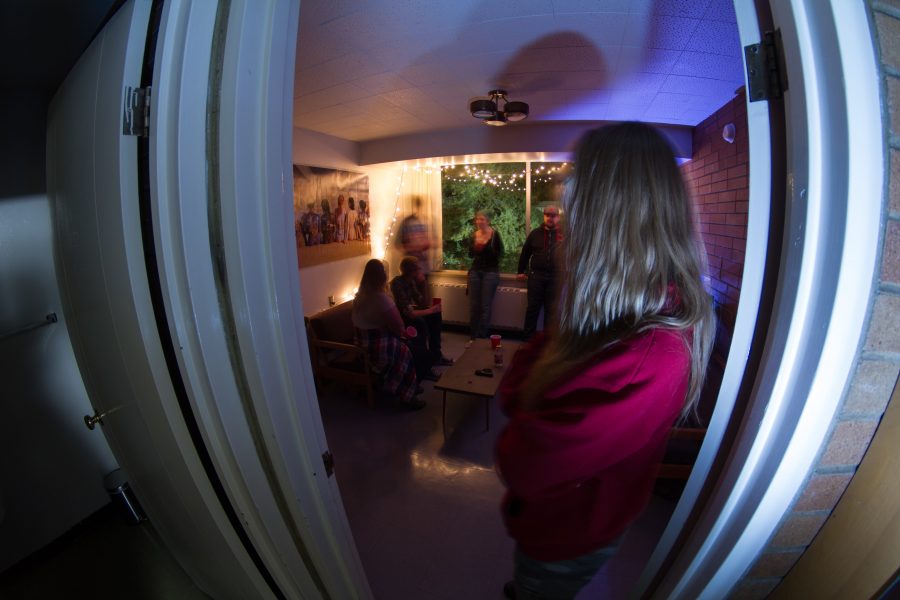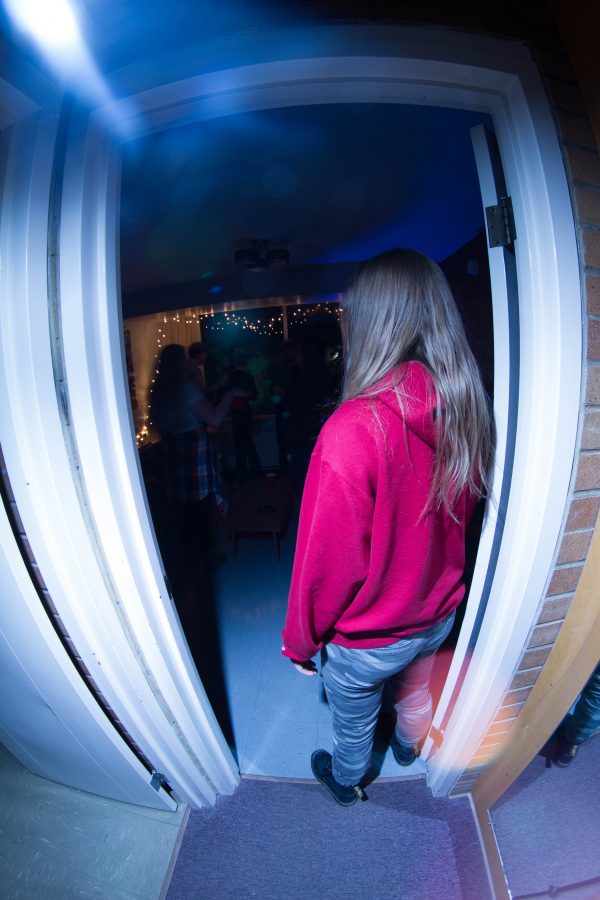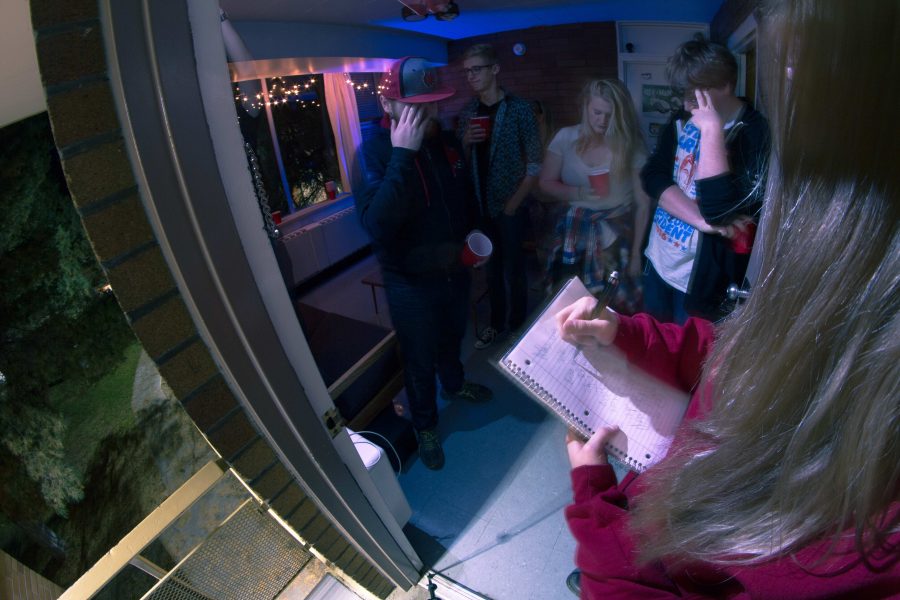Photo illustrations by Jack Lambert and Xander Fu
“We’re still students.”
RAs struggle with issues as they turnover at the highest rate since 2012
October 24, 2016
Editor’s note: The names of several former resident assistants (RAs) have been changed to protect their identity, as it is part of their contract not to speak to the press. Those who wished to remain anonymous use only first names. Full names are used for the former RAs who were willing to speak on the record.
Rachel, a resident assistant, wakes up at 2 a.m. to the sound of a student in tears. He is terrified at the sounds of the assault he is hearing next door.
He explains how he heard screaming and the sounds of someone being hit.
Rachel attempts to calm him down – while trying to remain calm herself.
She questions herself, wondering why she didn’t hear what happened.
Then she calls campus police and someone on the professional housing staff.
“Get over here as soon as you can because we’ve got a pretty big situation,” she tells them.
Two hours after she received the original call, the police finally leave at 4 a.m.
When the professional staff member arrives, she gives attention only to the resident who made the call, wanting to make sure he felt safe.
Nobody checks in with Rachel to see if she is alright.
“Before you go back to bed, finish the incident report,” the professional staff member tells her before leaving.
Rachel wasn’t able to sleep until 4:30 a.m.
Rachel is one of several former resident assistants for Central Washington University who have spoken with the Observer about their negative experiences working for housing. They complain about unrealistic expectations, lack of support, and counterproductive policies.
“They expect us to be robots on so many different levels,” Rachel said.
The turnover rate for housing was high during the 2015-16 school year. Housing documents received from a public records request made last May show that 12 RAs left during the fall quarter, eight of them for “personal reasons.” Eleven left winter quarter, one for “personal reasons.” And another seven RAs left for “personal reasons” at the end of spring quarter.
In total, 24 RAs resigned during the school year, leaving just 66 as of May. Normally, full staffing is considered to be 84 RAs. That leaves a resignation rate of 28.6 percent, almost three employees out of 10. The numbers provided were accurate as of May and came straight from documents provided by the university.
That’s the highest resignation rate since the 2011-12 school year, when documents show that just eight RAs resigned.

Why does turnover matter?According to several former RAs, this leads to a revolving door of staff and supervisors—some of whom arenot being properly trained. That can lead to RAs feeling overwhelmed and ineffective, which makes them less able to help the students who rely on them.
Residence Hall Coordinators (RHCs) “weren’t consistent. Everybody left – they kept leaving the position,” said Allison Gherna, a former RA, one of only a few who felt comfortable using her real name.
“How are we supposed to want to be in this RA position when the RHCs, our leadership, are getting new jobs and moving all over the place?” She said.
Over the course of several interviews last spring and this fall, Richard DeShields, associate dean of student living, addressed many of the reasons for why students left, and said that housing is constantly working to improve the jobs and lives for all RAs. He was concerned that this story was reflecting the bad experience of just a few people. But 17 students all complained of similar issues.
No updated records provided
This fall, The Observer filed a records request for updated information, but DeShields said there are not any recent numbers or any additional records available since last spring’s request. He also said there have been no additional RA resignations since May.
Further, although housing filled last spring’s request without asking for any clarifications, Deshields said Tuesday he believed the request was “confusing” and “difficult” to understand, because a “resignation” could also be a “finished contract.”
“A student goes to student teach … is that complete[d contract] or resigned?” DeShields asked. “A student who only planned to be an RA for two quarters and then graduated … Is that complete or resign?”
He also said Tuesday that information around an RA’s resignation is only kept for about a year, and that they don’t keep notes on the RA’s reasons for leaving.
In response to its records request last spring, The Observer was provided with copies of housing’s “End of Employment” staff files stretching back to fall 2012.
On each document, three choices could be checked off as the reason for leaving: “Terminated,” “Resigned,” and “Finished Contract.”
This indicates that there is a distinction between the three categories, and that these records have been kept for more than a year.
Always “the bad guy”

“In the process of doing our job, we look like the bad guy,” said Valerie, who didn’t want her real name used.
DeShields said RAs are trained to write an incident report (IR) for all situations – even ones in which they don’t end up taking action because the RA made a mistake. In that case, he said, the RA should note their mistake in the report.
Valerie agreed that “obviously, there’s some IRs that, no questions asked, you need to write.”
But she said this focus on documenting incidents makes residents believe that RAs only care about IRs and nothing more.
As a result, she said, the majority of interactions she had with residents were negative.
“I only had a few occasions where I walked away and the resident had respect for me,” Valerie said.
Little academic support
Rachel said she felt as if upper management didn’t understand that her studies were a priority.
“We’re students. We have midterms, we have finals, we have surprise tests that we didn’t know about that the teacher moved, or whatever; that is normal when you go to college,” Rachel said. “We experience that just like our residents do, but somehow we are not allowed to get the same understanding that we’re expected to give our residents.”
Gherna echoed the lack of support she was given for academic problems.
“They wouldn’t do the same thing for us as they would for a student, and we’re still students,” Gherna said.
She said RAs often have to rely on fellow student staffers to help them whenever something comes up, such as a test that they need to study for.
But according to Gherna, if an RA’s fellow members aren’t willing to work with them, then they are out of luck.
DeShields said that while some RAs struggle with academics, currently almost nine out of ten RAs have a GPA of 3.0 or above. RAs are still considered students and are expected to put their academics first, he said.
DeShields said that RAs are expected to be role models academically for students, so housing holds them to a minimum GPA of 2.5, and takes this standard very seriously.
“For some student staff, they leave because they haven’t met that minimum GPA,” DeShields said.
No emotion allowed
During her time as an RA, Rachel recalled not having support and being expected to not show emotion. At one meeting someone actually said that you need to suppress your emotions when in the public eye.
“She basically said, ‘You can be having the shittiest day of your life, but when you walk in that hall, you need to put a smile on your face and pretend that everything is okay,” Rachel said. “If you need to break down, you need to wait until you get to your room.”
Rachel explained how this expectation, coupled with RAs being discouraged from sharing too much information with residents, made it harder for the RAs to connect with their residents and appear more human.
 “Don’t tell anything to your residents you wouldn’t tell to your boss’s boss,” Rachel said she was told.
“Don’t tell anything to your residents you wouldn’t tell to your boss’s boss,” Rachel said she was told.
Under-trained, “overwhelmed”
Along with dealing with high expectations and lots of responsibility, Nancy said she felt unprepared as a mid-year hire CP. With turnover rates being as high as they are, teams can be left understaffed and undertrained.
“I felt really overwhelmed, not knowing what I was doing,” Nancy said. “I got maybe six or seven hours [of training] total.”
RAs say they typically receive several weeks of training in the summer and throughout the year – especially in a new RA’s first quarter. But they say a mid-year hire will only receive a minimal amount of training, most likely over several weekends.
DeShields said there is also constant training going on throughout the year for all of the student staff, whether on a weekly or monthly basis. If a situation arises that catches their attention, staff will be immediately trained on how to appropriately handle the situation.
As an example, DeShields said that last school year, an RA asked a student to remove a “Trump” sign from their room because of the way it made some students feel. The RA documented the situation and the student complied. But after housing staff reviewed it on a Monday, they decided that the student had a First Amendment right to have the sign. So they rectified the situation, and staff was trained on Wednesday about how to handle such issues.
Avenues for feedback
In response to questions about whether housing was taking into account the problems RAs cited as the reasons they left, DeShields pointed to the use of exit interviews, which he said the staff uses to see if any changes need to be made.
DeShields said housing provides other avenues for students to give feedback on their RA experiences, such as one-on-one meetings and multiple surveys that are administered and reviewed each quarter and year.
Culture of fear
It is important to note that RAs and other members of housing are contractually obligated to not speak to the media about their job without first receiving approval from DeShields.
DeShields said this is partially because of the Family Educational Rights and Privacy Act, or FERPA. Student staffers receive access to sensitive information about their residents, he said, and housing wants to ensure that what is said is both accurate and protects the privacy of other students.
No current members of housing felt comfortable going on the record about their experiences. Former members of housing who elected to keep their anonymity, did so because they feared backlash.
Colleen Plunkett said that even though she doesn’t work for housing anymore and will graduate this year, housing has instilled a lasting fear. And she said she’s not alone.
“I think there’s still fear in me,” Plunkett said. It was hard, she said, “being in an environment when you don’t feel respected.” She would reach out to her superiors for help and voice her concerns, but ultimately “they weren’t really addressed.”
Pros and cons
Even after her time as an RA, Rachel still was able to say that she did benefit from the job. Valerie agreed.
“Obviously being an RA there’s a lot of positives and negatives,” Valerie said. “But I gained a lot of skills that I am grateful for.”
Joseph Brooks said he enjoyed the xx years when he was an RA, but left before starting a second year because he was sick and would miss too much training But his close friends who are still RAs are telling him that conditions have gotten much worse.“If serious changes were implemented, I’d come back. I’m not opposed to it; like I said, I really liked my job, but I’m not going to come back with housing being as bad as everyone making it seem to be,” Brooks said. “If it was just random people telling me housing was really bad – like people who were just quitting – I’d be iffy about it. But these are people I’m actually really close with, and they’re telling me, ‘Don’t do it, don’t come back,’ and there’s a lot of them.”
Nancy’s advice to housing administrators as to how they can improve the working conditions for RAs and RHCs is that they should be honest with themselves and with students.
“I feel like housing tries to oversell themselves,” Nancy said, “and tries to make the job sound better than it is.”
DeShields agreed that it’s important that RAs are professional, and that they are trained so that they know how to handle issues on the job.
He described the job as a being in a “fishbowl,” because “everyone’s watching you.”

